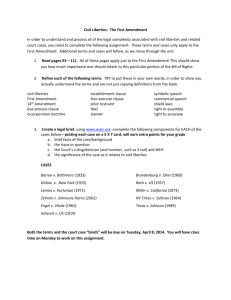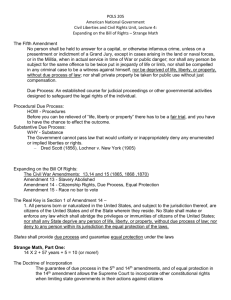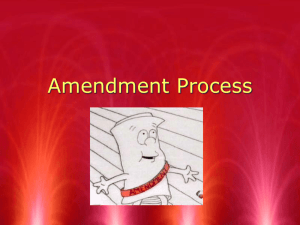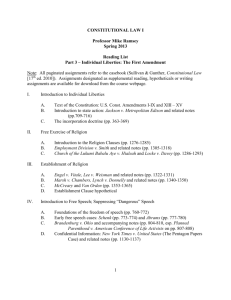Civil Liberties
advertisement
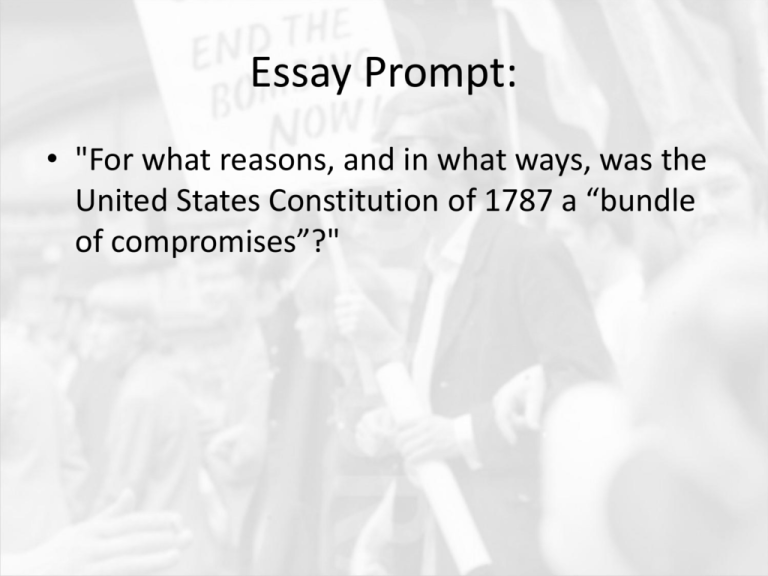
Essay Prompt: • "For what reasons, and in what ways, was the United States Constitution of 1787 a “bundle of compromises”?" Civil Liberties The Basis for Any Democracy What Are Civil Liberties? • Civil Liberties: – Basic rights and freedoms that are guaranteed -either in the Bill of Rights/Constitution, or interpreted in Courts • Free Speech, Free Press, Free from Search & Seizure, etc. • Civil Rights: – Basic right to be free from unequal treatment based on certain protected characteristics (race, gender, disability) • What right’s affected? v. Whose rights affected? Bill of Rights: Civil Liberties Amendments • 1st Amendment: – Freedom of Religion, Speech, Press, Petition, Assemble • Establishment Clause: – Congress shall make no law endorsing/ estbl. a religion – Estbl. Separation of Church & State…How closely have we followed this? • Free Exercise Clause – Prevents infringement on people’s right to believe in whatever religion they choose (some religious practices can be restricted however…) – Limits on Free Speech • • • • Clear & Present Danger Doctrine (Schenck v. U.S.) Obscenity (Roth v. U.S.) Libel/Slander (written/spoken defamation) Commercial Speech Regulated by FTC/FCC Bill of Rights: Civil Liberties Amendments • 2nd Amendment: – Right to Bear Arms • “A well regulated Militia, being necessary to the security of a free State, the right of the people to keep and bear Arms, shall not be infringed.” • 3rd Amendment: – Prohibits Quartering of Troops Bill of Rights: Civil Liberties Amendments • Amendments 4-8 – 4th: Protection against illegal search & seizure • Probable Cause/Warrant • Exclusionary Rule (Mapp v. Ohio) – Evidence gathered thru illegal search & seizure can’t be submitted in court of law – Deterrent to unlawful police action – 4th Amendment Under Attack – – – – – Terry Frisk Pretext Stops Drug Courier Profiles “Consent Searches” Patriot Act Bill of Rights: Civil Liberties Amendments – 5th: Right to grand jury, no double jeopardy, can’t be forced to testify against self, due process • http://www.comedycentral.com/videoclips/3vk26x/chappelle-s-show-tron-carter-s-law---order – 6th: Speedy/public trial w/ impartial jury; Right to Confront witnesses; Right to counsel; prevents suspension of habeas corpus – 7th: Jury trial in civil cases – 8th: Free from excessive bail; cruel & unusual punishment – Upheld by Gregg v. Georgia Bill of Rights: Civil Liberties Amendments • 9th Amendment: – Protects rights of the people that are not specifically enumerated in the Constitution – i.e. Right to Privacy • 10th Amendment… • Outlining Federalism/“Reserved Powers” • Any power not given to the federal government…nor denied to the states…are reserved for the states • 14th Amendment: – “No state shall make or enforce any law which shall abridge the privileges or immunities of citizens of the united states nor shall any state deprive person of life, liberty or property without due process of law; nor deny any person within its jurisdiction equal protection of laws” – Incorporation “INJUSTICE ANYWHERE, IS A THREAT TO JUSTICE EVERYWHERE!” MLK JR. Criminal Process 1. Evidence Gathered: – 4th Amendment—forbids unreasonable search & seizure (exclusionary rule) 2. Suspicion Cast/Arrest Made – 6th Guarantee habeas corpus—forbids imprisonment without evidence – 5th Amendment—Right to remain silent; due process “INJUSTICE ANYWHERE, IS A THREAT TO JUSTICE EVERYWHERE!” MLK JR. • Interrogation Held: • 5th Amendment: Forced self-incrimination forbidden • 6th Amendment: Right to Counsel • 8th Amendment: Excessive bail forbidden • Trial Held: • 4th Amendment: Exclusionary Rule (Mapp v. Ohio) • 5th Amendment: No “Double Jeopardy” • 6th Amendment: “Speedy & Public Trial” by an impartial jury ; Right to confront witnesses; Right to counsel • Punishment Imposed: • 8th Amendment: Protection from Cruel & Unusual Punishment What is Federalism? • System of government which is divided into levels…central/national government and regional governments (aka states)…and where power is divided (as well as shared in some areas) • How does this differ from Unitary & Confederate Governments? Colbert--If At First You Don't Secede States: Reserved Powers • 10th Amendment: “Those powers not delegated to the federal government, nor prohibited to the states, are reserved for the states.” (AKA Reserved Powers) • State Obligations to Each Other: – Full Faith & Credit Clause; Extradition • Pros – – – – – – – – Why Federalism? Check Government Power/Protect Personal Liberty Power Concentrated in Single entity → Tyranny Under A.o.C. → Nat’l Govt Too Dependent on States Provide Balance between Nat’l & State Govt. STATES = TESTING GROUNDS Large Countries; Diverse Regions Allows for local action—local concerns More access points/ways to participate • Cons – Can be inefficient – Failure to implement at the state level – Conflicts can arise between state and federal government…

